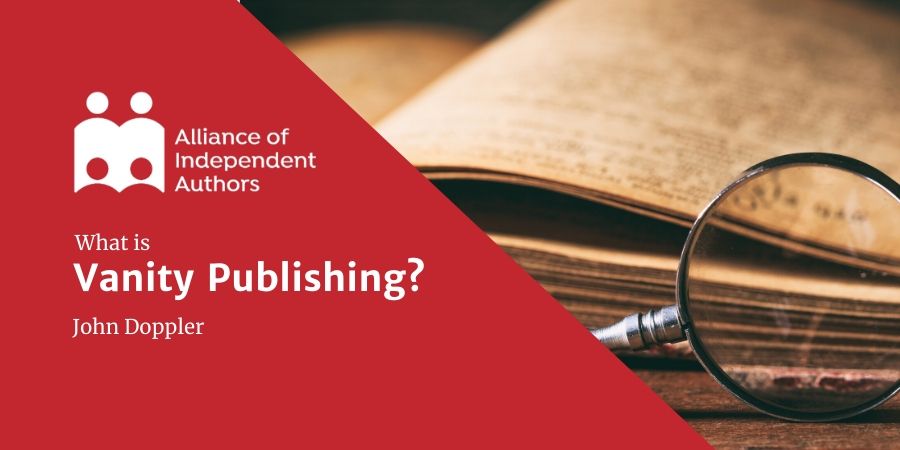It's widely accepted that vanity publishing is bad for authors. But what, exactly, is “vanity publishing”? Where do we draw the line between a publisher, a reputable publishing services company, and a vanity press?
Vanity Publishing: An Outdated Definition?
Before self-publishing became widespread, the words ‘vanity press' were considered a last resort for authors whose books were not deemed commercially viable by traditional publishers. Vanity publishers would publish any work and the assumption was that if an author was forced to seek out this kind of uncurated, pay-to-play publishing service, they were doing so purely out of vanity.
It was a clear binary: the perceived prestige of traditional publishing on one side, and across a vast gulf, the less-than-reputable realm of vanity publishing.
But the publishing industry has evolved dramatically from those days — and exponentially in the last ten years. The debut of self-publishing platforms from Amazon, Apple, Ingram and others opened the door to a tremendously diverse range of independent (indie) authors, from one-off authors publishing their memoirs; to hobbyists; to professional authorpreneurs.
With the rise of so many successful indie authors, self-publishing is leaving behind the stigma of “less-than” third-party publishing. At the same time, it has introduced new business models for publishers, publishing services, and authors. And that's where the old definition of “vanity press” gets less black-and-white.
The old binary of traditional or vanity has given way to a spectrum of publishing options, and in that new, broader context, the reductionist definitions that entered our lexicon nearly eighty years ago are no longer meaningful or appropriate.
At ALLi we define a “vanity” press as , or screaming “vanity” everytime you see an author who is willing to pay for support.
We have kept the negativity implied in the “vanity press” appellation to distinguish between bad-actors in the marketplace versus publishing services companies that are competent and valuable to the kind of author who is willing to pay for support.
The Publisher is the Investor
In our highly diverse publishing environment, a core distinction remains: who is paying? There are seven processes of publishing (editorial, design, production, distribution, marketing, promotion and rights licensing) and the business entity that pays for those processes upfront–in other words, that invests in the success of the book–is the publisher.
That business may be an author publishing their own books (self-publishing) or a business publishing other writers' books (third-party publishing).
Sometimes, those third-party (traditional, trad, or trade) publishers are huge conglomorates, like Penguin Random House. Sometimes they are small, indie operators (indie publishers). Sometimes they are other authors. The point is: they invest in the publishing process.
That is what makes them publishers.
Self-Publishing: The Author is the Publisher
When an author pays for services, the author is the publisher, even if they use a single service to help them through all seven processes, and even if that service calls itself a publisher.
It is not a publisher. It is a publishing service.
In the old days of vanity versus genuine publisher, the principle used to be: follow the money. If money flowed to the author, in the form of advances or royalties, they were dealing with a publisher. If they were being asked to pay, it was a vanity press.
These days, things are not so clearcut and many authors use publishing services to get them through the publishing process.
Publishing Services: The Good, The Bad & the Vanity
Publishing services can be good, or they can be outright exploitative. Most often, they fall somewhere between the polarities. Distinguishing between them is not easy, which is why ALLi has a Watchdog Desk to help guide authors through.
 How do you assess? Our book Choose The Best Self-Publishing Service goes through this in detail but here let's look at some of the metrics the ALLi Watchdog Desk examines when considering a service for:
How do you assess? Our book Choose The Best Self-Publishing Service goes through this in detail but here let's look at some of the metrics the ALLi Watchdog Desk examines when considering a service for:
- ALLi's Self-Publishing Services Ratings Page (an open list of publishing services: The Good, the Bad, and the Vanity)
- ALLi Partner Membership (for services who agree to be vetted by ALLi and abide by our Code of Standards for Partners)
Those metrics are control, curation and quality, value for money, marketing services, and intent.
Vanity Publishing: Control
Author John Scalzi pins the distinction on control. He proposes a corollary to the law that dictates that money should flow towards the author: “While in the process of self-publishing, money and rights are controlled by the author.” That criterion comes closer to the litmus test we seek, but it's still insufficient to distinguish a predatory vanity press from a legitimate publishing service.
Vanity Publishing: Curation & Quality
Vanity presses do not vet submissions, and will publish nearly anything if you're willing to pay, but that's also true of many reputable publishing services companies. Some do curate but many more provide reasonably priced and well executed editing, formatting, cover design, upload, distribution, and marketing without ever passing judgement on the content of the book.
Some vanity presses provide abysmal quality, while others provide competent results. At the same time, honest and well-meaning companies may turn out substandard work, either through inexperience, taking on more work than they can handle, or incorrectly assessing their own skills. This includes authors who opt to publish other authors' work.
At ALLi's Watchdog Desk, we identify unqualified and incompetent service providers as well as bad-actor vanity presses–but, even though both should be avoided, it's important not to conflate them. A service can be low-quality without being malicious, and a service can be malicious while still putting out good quality.
Quality is an important attribute to assess when selecting a service provider, but good or bad, it can't identify a vanity press.
However, it does impact our next metric: value.
Vanity Publishing: Value for Money
Value is sometimes difficult to assess, especially for services like marketing where the impact may be hard to quantify. (That fact often gives cover to companies that provide worthless, overpriced, and overhyped marketing services.) For most services, though, it's a simple calculation: How many books will I need to sell to pay for this service?
Divide the cost of the service by the return you get on one book. That's the number of books you will need to sell just to break even, let alone turn a profit.
If that number would make you a New York Times Best Seller, and you want your book to be profitable, thank the salesperson for their time and walk away. You are extremely unlikely to sell to bestseller levels, and no service in existence will singlehandedly catapult you to such heights.
One hallmark of a vanity press is charging wildly inflated prices for services. Editorial reviews that sell for $425 from Kirkus are resold for $3,000.00. Worthless press releases are peddled for hundreds or even thousands of dollars. Copyright registration available for $35 online is sold at a 400% markup.
A company that exploits its clients in this way is a vanity press. And now we're zeroing in on the crux of the matter, as selling these overpriced services colors every aspect of the company's behavior.
Vanity Publishing: Marketing Practices
Vanity presses engage in aggressive, misleading, and deceptive tactics to sell their services. The tricks they use are too numerous to list here, but some of the more common ones are:
- unrealistic promises
- stoking the author's ego
- preying on insecurities; negging
- pushing unnecessary or worthless services
- high-pressure sales
- aggressive upselling
- hiding costs
- misrepresenting costs
- bait-and-switch tactics
A reputable company empowers clients with the information they need to choose the right service for their needs. That's in stark contrast to the deceitful and manipulative tactics used by vanity presses, where the goal is to sell the authors as many services as possible.
Intent
A good publisher profits by selling books to readers. It's a win-win partnership: when the publisher profits, the author profits.
A vanity press perverts that relationship by turning it into a zero-sum game. When the vanity press profits, the author loses, because that money comes directly out of the author's pockets. In many cases, the vanity press profits by forcing the author to buy their own books through mandatory purchase clauses in the contract.
And this, above all others, is the criterion that separates a vanity press from a legitimate publisher or service provider. One seeks to help authors sell books to readers, and the other seeks to empty the author's pockets.
Putting It All Together: A Definition of Vanity Publishing
In the course of analyzing hundreds of service providers, ALLi's Watchdog Desk identified three consistent indicators of a vanity press: poor value, unethical marketing practices, and exploitative intent. We then arrived at the following definition:
ALLi's definition of a vanity press is a publishing service that engages in misleading or, in the worst cases, outright deceptive practices, with the intention not of bringing books to readers but of extracting as much money as possible from the authors.
This is a definition which firmly identifies vanity presses while excluding genuine publishers and reputable service providers.





Your article doesn’t mention distribution. In my opinion, this is one of the distinctions between reputable publishers in any format and the less reputable ones. In academic publishing, distribution through libraries and other institutions is the key to impact in a field. However, distribution is only one of the features of a reputable publisher. The central distinction is the review process provided by academic publishers (and I believe reputable publishers of novels).
Maybe not so much. Publishers sell books to book sellers who, in turn sell to readers.
Has anyone, including the author of this piece, purchased a book from Penguin, Simon & Schuster, Macmillan, or any other publisher? Even vanity publishers don’t sell to consumers – they sell to authors and, theoretically, to other retail outlets.
If we’re going to bash an industry it is incumbent upon the basher to get her/his story right in ALL respects.
I think this is an excellent definition of the term vanity press and much more realistic to today’s publishing environment than the one presently on Wikipedia and still used by many mainstream publishers and mainstream-published authors to denigrate any service for which the author pays. Considering that a self-published author also has to pay for various services, such as editing and cover design, the old use of the term can indeed be used for self-publishers in general, but with so many options in the pay-for-publishing-services sphere, it’s a misleading way to use the term today.
The word ‘vanity’ is the key. The vanity press publisher preys on the author’s vanity by building unrealistic expectations to sell overprices services. As you so aptly point out it’s ‘a publishing service that engages in misleading or, in the worst cases, outright deceptive practices, with the intention not of bringing books to readers but of extracting as much money as possible from the authors.’
Any chance you could update the wikipedia entry for vanity press?
We would need somebody who is a Wikipedia Editor. Will do a callout on the forum.
Oh come on. You’re trying to redefine and “update” the Aunt Jemima brand and picture here. “Vanity Press” is a derogatory, meaningless, and insulting term and should be dropped from the vocabulary. There are reputable publishers and cheats; there are reputable companies that provide publishing services for indies and there are cheats. Compare prices and ask for references like you would do in any industry. But please lets drop completely a term that was only ever intended to shame anyone who self-published.
I read somewhere that the term ‘Vanity Publishing’ was coined by the traditional publishers as a derogatory term for self-publishing in general.